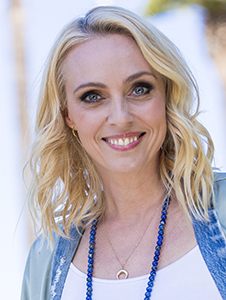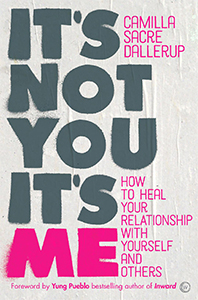How To Say No With Confidence

 You can be a kind person and still say no, says life coach and international best-selling author Camilla Sacre-Dallerup
You can be a kind person and still say no, says life coach and international best-selling author Camilla Sacre-Dallerup
Drop the grandkids off at school. Check. Pop over to Mum’s after work. Check. Work on that report tonight because you promised your boss he’d have it in the morning. Grudgingly… check.
When you feel like you’re being pulled in multiple directions, but you’re continually obliging when asked to do something, have you ever considered saying no?
When your own cup is continually emptying and you’re doing all this stuff for other people to make them happy, eventually you’ll have nothing left to give. And then who’s going to pick you up? It’s time to look at a new strategy!
Let’s get one thing clear – you can be a kind and good person and still say no.
The trick is to get comfortable with being uncomfortable when setting those boundaries.
It’s not within your control how someone might react when you say no to them, so you have to make peace within yourself to be OK with that, even if they aren’t!
That’s why working on our self-love and self-worth is so important. It helps us feel stronger when communicating and setting those dreaded boundaries.
Set your boundaries
Here’s an example. If a friend says she is going to phone me this evening, I’ll say, “Please don’t call me after 9pm, because I go to bed at 9:30.” She might think I’m boring but that’s on her.
If you know in your heart that you’re a good person – that you are a worthy person – then what someone else might think when you’re setting a boundary shouldn’t matter to you.
Of course, we are all generally kind people and no one wants to purposely upset anybody, but is anyone thinking about how you might be feeling?
If, for example, a relative wants you to be available for them for the third time that week, it might be something you’ve actually enabled in your family. It probably happened over time without you even realising.
You might have always immediately wanted to say no, but have instead blurted out ‘yes’. But now the penny has dropped and perhaps you’re starting to feel a bit reluctant as well as a bit guilty.
Maybe you’re simply exhausted from finding yourself in situations you don’t like.
When you start to set boundaries and politely say ‘no’, you may never feel entirely comfortable doing that. But the key is to make peace with it and set the boundaries anyway.
Try asking yourself these questions before you say yes
- What would happen if I didn’t go?
- What wouldn’t happen if I went?
- For what purpose would I say yes?
- If I say yes, what would it cost me emotionally and mentally?
- Can I say no and feel totally OK with that?
Considering and answering these questions (in meditation, if you wish) is a great way of helping you to understand yourself better so that you can respond in a new way.
Practising this kind of self-love can also support you in developing more compassion for yourself. In turn you can feel more and more at ease with making the right choices for you, rather than those that only please others.
Another important spiritual lesson is knowing you are enough and knowing what your own needs are.
When we fully know what we need in life, we can communicate that with ease.
It’s also helpful to look at what I call ‘The shoulds’. It’s something we can all be considering. We’re all likely to feel as if we should be doing something at some time or another, even when we don’t particularly want to.
‘I should meet Ellen for coffee’, ‘I should watch little Harry’s football match today even though I’ve got a cold and his parents will be there’, ‘I should make Dad’s dinner tonight to save my sister the trip, despite me having done it every night this week’ and so on. Sound familiar?
There are certain things you choose to do out of love for your kids, your parents and your friends, but it’s important to achieve a balance, too.
If you run around doing all the things you feel you should be doing for others and none of the stuff that lights you up, you could end up feeling very empty.
Who is doing something – anything – for you?
This is where setting boundaries can really help. Ask yourself, ‘What do I need for me? What is the one thing I won’t negotiate on that will benefit my needs?’
Perhaps it’s a class you enjoy, or a social meet-up?
For me, I will not negotiate on my eight hours’ sleep, because without that I don’t feel OK, mentally.
But what if you’ve got comfortable with saying no (OK, not quite comfortable, but you’re gritting your teeth and pressing on) and you’ve Actually. Said. No?
You’ve bitten the bullet and are waiting for the ‘It’s absolutely fine, don’t worry!’ But instead you’re met with a stony silence. Or maybe even a few cross words. What then?
Finding a more compassionate way through a difficult situation and releasing an emotional blockage can help.
If your boundary setting is met with resistance, remember what I said before: that’s on them, not you!
Unless the situation is an emergency of course, you have to step back, drop into your heart space and send them love.
They may think you’re being selfish and that at that moment their needs are more important, but all you can do is make sure you communicate clearly how you feel and try not to fall into the trap of needing to justify why you have said no.
A great exercise to practise is saying ‘No, sorry I can’t’, rather than ‘No, sorry I can’t because…’ Then send yourself love and accept that it’s OK that they don’t understand. Maybe they will, given a little time.
 Discover more confidence-boosting tips and advice in It’s Not You, It’s Me by Camilla Sacre-Dallerup (£9.99, Watkins Publishing)
Discover more confidence-boosting tips and advice in It’s Not You, It’s Me by Camilla Sacre-Dallerup (£9.99, Watkins Publishing)
Find more information about Camilla here






